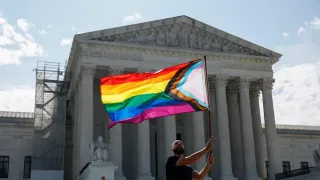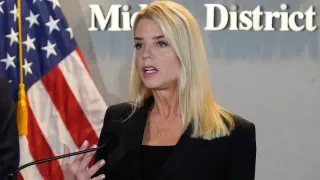
2 hours ago
Alabama State Library Board Moves to Ban Books That Positively Depict Transgender People
READ TIME: 3 MIN.
The Alabama Public Library Service (APLS) Board is considering a sweeping amendment to its administrative code that would force public libraries across the state to remove and ban books with “positive portrayals” of transgender people, gender nonconformity, or more than two genders from youth sections. The proposal, which is now open for a 45-day public comment period, has become the latest flashpoint in a broader national debate over access to LGBTQ+ materials in public institutions .
At a recent APLS board meeting, member Amy Minton, who is seeking a state Senate seat, advanced the amendment to restrict children’s access to any content with “positive portrayals” of transgender people or what she termed “gender ideology.” Board chair John Wahl has also pushed for the restrictions, warning that state funding for libraries may be withheld from institutions that do not comply . The proposed changes require libraries to review their collections, programming, and policies to ensure no materials that “promote, encourage, or positively depict transgender procedures, gender ideology, or the concept of more than two biological genders” are available to individuals under 18 .
This language, buried alongside regulations on explicit content and obscenity, has been criticized by opponents as both discriminatory and imprecise. Notably, the proposal does not explicitly ban negative depictions of transgender people, raising fears that it could result in a one-sided, stigmatizing representation of transgender lives and experiences in Alabama’s public libraries .
The proposal has drawn pointed criticism from civil rights groups, library associations, and many Alabama residents. Former APLS Board president Ron Snider, the only member to vote against the measure at the last meeting, denounced the move as “censorship” and “massive government overreach,” warning that it represents “a direct attack on the freedom to read” . Snider further cautioned that such restrictions erode basic rights and equality, noting that bans of this nature risk “banning people themselves” by erasing positive representation of transgender identities from public view .
Advocates for transgender and LGBTQ+ youth stress the real-world impact of such policies. Alyx Kim-Yohn, an organizer with the Alabama Transgender Rights Action Coalition, stated, “It seems fairly innocuous to remove a book, until you look at the real lived experiences of trans folks who go through their adolescence never knowing how to describe their gender or their sexuality, never meeting people like them. That happens as a direct result of not having access to stories about themselves or meeting other people like them” .
Book bans targeting LGBTQ+ representation have surged across the United States in recent years, with Alabama joining a growing list of states seeking to restrict access to materials concerning sexual orientation and gender identity in public institutions. Advocacy organizations warn that such measures not only curtail intellectual freedom but also undermine mental health and well-being among LGBTQ+ youth, who often rely on literature to see their identities reflected and affirmed .
The push for the Alabama ban is closely linked to the efforts of Clean Up Alabama, a group that has compiled a blacklist of books it wants removed from public libraries. The list overwhelmingly targets works by LGBTQ+ authors or those depicting LGBTQ+ topics, including children’s picture books like *Calvin*, a story about a transgender child, and *Red: A Crayon’s Story*, which uses the metaphor of a mislabeled crayon to discuss self-acceptance . Clean Up Alabama’s public communications explicitly urge supporters to call for the complete removal of such books from library youth sections, and in some cases, from libraries altogether .
Legal experts and free speech advocates have raised concerns that the proposed ban may violate both the First Amendment and established federal library policies. The American Library Association and other national organizations have repeatedly cautioned that policies singling out specific identities or viewpoints for censorship are unconstitutional and undermine the foundational principles of public libraries as inclusive spaces for all .
Opponents of the policy have also pointed to the vagueness of terms like “gender ideology,” which remain undefined in both the board’s proposal and the supporting executive order issued by former President Donald Trump in January. This ambiguity, critics argue, leaves librarians, educators, and families vulnerable to arbitrary and inconsistent enforcement .
The public comment period on the proposed rule change remains open until October 14, with a public hearing scheduled for October 21 at the APLS office in Montgomery. LGBTQ+ organizations, library patrons, educators, and concerned residents are mobilizing to submit comments and attend the hearing in opposition to the policy, emphasizing the importance of representation, inclusion, and intellectual freedom for all Alabamians .
As the debate continues, the outcome in Alabama could have significant implications for the future of LGBTQ+ representation in public libraries nationwide. Advocates urge those who support inclusive access to information to make their voices heard during the ongoing public comment process.






